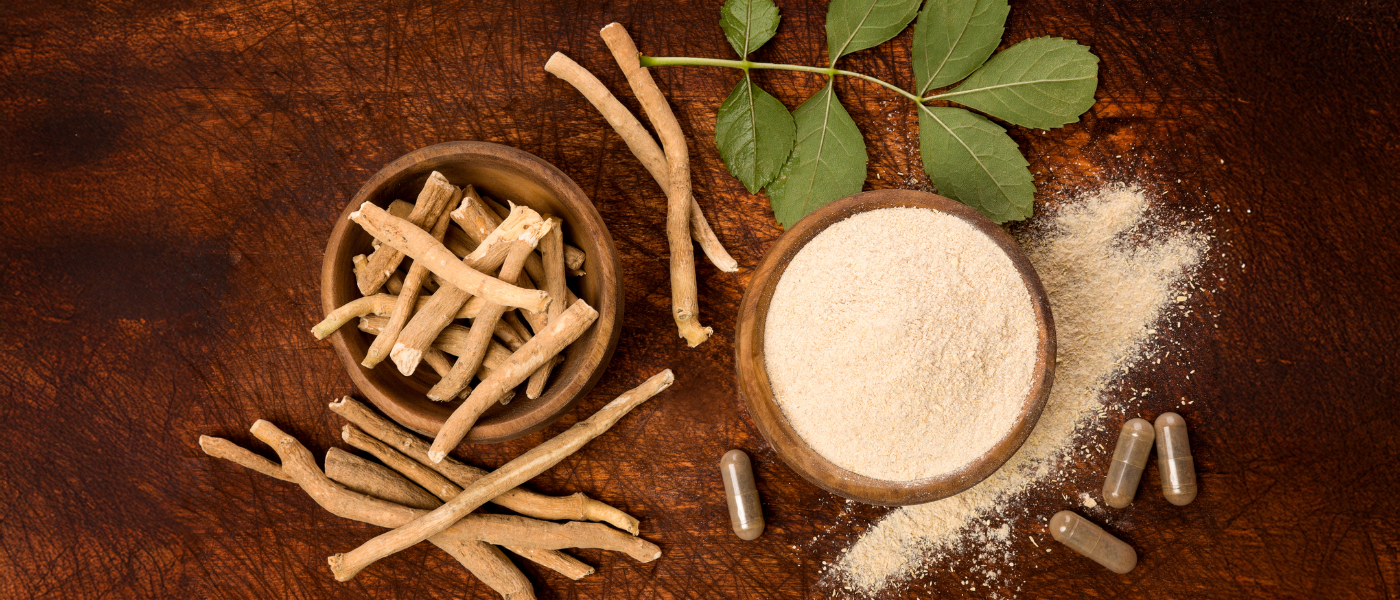How Much Ashwagandha for Stress, Sleep, Energy Support, and Wellness
Authors:

Ashley Palmer
Nutritional Therapy Practitioner, Health & Wellness Expert
Key Takeaways:
Key Points:
- Ashwagandha is a well-known adaptogenic herb used for stress relief, cognitive support, physical and even sexual wellness.
- Recommended ashwagandha dosages vary slightly depending on the use case.
- Always look for a high-quality supplement with third-party testing to ensure a pure product.
Adaptogenic herbs like ashwagandha have exploded in popularity over the last several years, touting benefits like mood and hormone balance, cognitive function, improved sleep, and more. If you’re in search of any of these benefits, should you take an ashwagandha supplement? In this article, we’re investigating the benefits of ashwagandha and the science-backed dosages recommended for various effects.
Table of Contents:
-
What Is Ashwagandha and What Are Its Benefits?
-
Recommended Ashwagandha Dosage
-
What Factors Influence Ashwagandha Dosage?
-
What Should You Look for in Ashwagandha?
-
What Are Risks and Side Effects of Ashwagandha?
-
Getting Started with Ashwagandha
What Is Ashwagandha and What Are Its Benefits?
Ashwagandha (Withania somnifera), commonly referred to as Indian ginseng or winter cherry, is a powerful adaptogenic herb known for enhancing the body’s resilience to stress. Native to India, the Middle East, and northern Africa, it has been a staple of Ayurvedic medicine for centuries, promoting overall health, balance, and vitality.
Ashwagandha supplements support healthy adrenal function by lowering perceived stress and promoting balanced cortisol levels. The effects of ashwagandha include reducing stress and anxiety, improving calmness, enhancing sleep quality, and strengthening the body’s overall stress response.
Ashwagandha offers diverse benefits including enhanced stamina, better memory, stress relief, restful sleep, and improved sexual wellness.
Recommended Ashwagandha Dosage
The optimal dosage varies by goal, with studies showing effectiveness between 120 and 5,000 mg daily. The most common dosage used in scientific research is 600 mg per day, split into two 300 mg doses.
| Purpose | Recommended Dosage |
|---|---|
| Athletic Performance | 500–1,000 mg per day, divided into two doses |
| Cognitive Function | 300–600 mg per day |
| Stress Relief | 500–600 mg per day |
| Sleep Support | 600 mg or more per day |
| Sexual Wellness (Women) | 600 mg per day |
| Sexual Wellness (Men - Libido) | 300 mg twice daily |
| Sexual Wellness (Men - Fertility) | 675 mg per day |
Ashwagandha Dosage for Athletic Performance
Taking 500–1,000 mg of ashwagandha per day, divided into two doses, is an effective way to boost athletic performance by improving muscle strength, endurance, and oxygen consumption during exercise. Commonly used as a dietary supplement by athletes and fitness enthusiasts, ashwagandha extracts have shown promising results in several studies.
Long-term supplementation offers the best outcomes. A meta-analysis involving 615 adults found that ashwagandha supplements were significantly more effective than a placebo in improving muscle strength, cardiorespiratory fitness (VO2 max), fatigue recovery, and overall exercise performance. Participants also experienced reduced post-exercise muscle damage and enhanced physical and mental recovery.
Another study reported that doses of 750–1,250 mg daily for 8 weeks improved VO₂ max and cardiorespiratory endurance. These performance-enhancing effects are linked to ashwagandha’s ability to lower cortisol, the body’s main stress hormone, which helps reduce muscle fatigue and improve recovery after intense workouts.
Overall, consistent use of ashwagandha supplements within this dosage range is recommended for those seeking to support physical performance and manage stress levels during exercise.
Ashwagandha Dosage for Cognitive Function
A daily dose of 300–600 mg has been linked to improved memory, focus, and reduced stress. Long-term benefits include enhanced attention and processing speed. One study found that participants taking 300 mg of sustained-release ashwagandha for 90 days saw significant improvements in memory, attention, and processing speed. They also reported reduced stress, better sleep quality, and an overall boost in well-being, all without any adverse side effects.
Similarly, a 400 mg dose of ashwagandha extract has also been linked to enhanced executive function, sustained attention, and working memory in young participants. In another 8-week trial, older adults with early signs of dementia who took 600 mg daily saw improvements in memory, executive function, attention, and processing speed.
Ashwagandha’s benefits extend beyond cognition. One study using 600 mg per day demonstrated its effectiveness for weight management, showing reductions in body weight and BMI compared to a placebo. Researchers attributed this to the effect of ashwagandha on mental well-being, as participants experienced fewer food cravings and reduced stress-related eating.
Ashwagandha Dosage for Stress
Ashwagandha is a well-known adaptogen recognized for its ability to reduce stress and anxiety by lowering stress hormones and promoting emotional resilience. Several studies lasting 6 to 8 weeks found that participants taking ashwagandha reported feeling calmer, less fatigued, and experienced better sleep. The herb was also effective in lowering stress hormones.
A 2021 systematic review analyzed seven clinical trials involving 491 adults with high stress or anxiety showed that ashwagandha per day, at doses between 240 and 1,250 mg or 12,000 mg/day of whole root powder, consistently reduced stress, anxiety, and fatigue while lowering cortisol levels. The best results were observed with daily doses of 500 to 600 mg of ashwagandha root extract. Research indicates that higher doses within this range are generally more effective than lower doses for reducing stress and anxiety over the long term.
Ashwagandha Dosage for Sleep
Ashwagandha has shown promising effects in promoting restful sleep and improving sleep quality. Several small studies on ashwagandha supplements suggest that ashwagandha extracts can help people with sleep difficulties fall asleep faster, sleep longer, and wake up less frequently during the night. While the overall improvements were modest, the most noticeable benefits occurred with doses of 600 mg or more per day, taken consistently for at least 8 weeks.
Ashwagandha Dosage for Sexual Wellness
Ashwagandha has shown promising results in enhancing sexual health for both men and women. In a 2022 randomized, double-blind, placebo-controlled study, females who took 600 mg of ashwagandha daily for 8 weeks experienced significant improvements in arousal, lubrication, orgasm, and overall sexual satisfaction compared to those in the placebo group.
For males, another 2022 randomized, double-blind, placebo-controlled study found that taking 300 mg of ashwagandha twice daily for 8 weeks improved sexual function and increased testosterone levels in participants with low libido.
Additionally, a pilot study found that 675 mg/day of ashwagandha root extract for 90 days significantly boosted sperm count, semen volume, sperm motility, and testosterone levels in men with oligospermia, suggesting its potential benefits for male fertility.
What Factors Influence Ashwagandha Dosage?
Your ideal ashwagandha dosage depends on your health goals, supplement form (powder vs pill), individual tolerance, and the duration of use.
What Should You Look for in Ashwagandha?
Root-based supplements are commonly used in studies and are considered more effective for stress relief, cognitive support, and physical performance as compared to ashwagandha derived from the berries of the plant. Choose products with 5% withanolides, the active compound responsible for ashwagandha’s benefits.
Also, choosing supplements from reputable brands with third-party testing ensures the product is pure, potent, and free from harmful contaminants. Quality manufacturing and transparent ingredient sourcing further guarantee you’re getting a safe and effective product.
What Are Risks and Side Effects of Ashwagandha?
Ashwagandha supplements are generally safe for short-term use, typically up to 3 months, but more research is needed to confirm their long-term safety. Common side effects include drowsiness, upset stomach, diarrhea, and vomiting. People who are pregnant, breastfeeding, or have autoimmune or thyroid disorders are recommended to avoid ashwagandha. It may also interact with medications for diabetes, high blood pressure, seizures, and thyroid conditions, as well as sedatives and immunosuppressants.
Because ashwagandha can raise testosterone levels, those with hormone-sensitive prostate cancer should avoid its use. Individuals undergoing surgery should also refrain from taking it due to potential interactions. To minimize risks, start with a low daily dose of ashwagandha, consult a healthcare professional, and choose high-quality supplements to ensure safety.
Getting Started with Ashwagandha
Ashwagandha is a powerful adaptogenic herb that helps manage stress, improve sleep, enhance cognitive function, boost athletic performance, and support sexual wellness. Its effectiveness depends on dosage, typically ranging from 300–600 mg per day, tailored to specific goals. Dosage effectiveness depends on the supplement form and individual tolerance, so choose high-quality products with standardized withanolides.
Ambiye, V. R., Langade, D., Dongre, S., Aptikar, P., Kulkarni, M., & Dongre, A. (2013). Clinical Evaluation of the Spermatogenic Activity of the Root Extract of Ashwagandha (Withania somnifera) in Oligospermic Males: A Pilot Study. Evidence-based complementary and alternative medicine : eCAM, 2013, 571420. https://doi.org/10.1155/2013/571420
Bonilla, D. A., Moreno, Y., Gho, C., Petro, J. L., Odriozola-Martínez, A., & Kreider, R. B. (2021). Effects of Ashwagandha (Withania somnifera) on Physical Performance: Systematic Review and Bayesian Meta-Analysis. Journal of functional morphology and kinesiology, 6(1), 20. https://doi.org/10.3390/jfmk6010020
Chandrasekhar, K., Kapoor, J., & Anishetty, S. (2012). A prospective, randomized double-blind, placebo-controlled study of safety and efficacy of a high-concentration full-spectrum extract of ashwagandha root in reducing stress and anxiety in adults. Indian journal of psychological medicine, 34(3), 255–262. https://doi.org/10.4103/0253-7176.106022
Chauhan, S., Srivastava, M. K., & Pathak, A. K. (2022). Effect of standardized root extract of ashwagandha (Withania somnifera) on well-being and sexual performance in adult males: A randomized controlled trial. Health science reports, 5(4), e741. https://doi.org/10.1002/hsr2.741
Choudhary, D., Bhattacharyya, S., & Bose, S. (2017). Efficacy and Safety of Ashwagandha (Withania somnifera (L.) Dunal) Root Extract in Improving Memory and Cognitive Functions. Journal of dietary supplements, 14(6), 599–612. https://doi.org/10.1080/19390211.2017.1284970
Gopukumar, K., Thanawala, S., Somepalli, V., Rao, T. S. S., Thamatam, V. B., & Chauhan, S. (2021). Efficacy and Safety of Ashwagandha Root Extract on Cognitive Functions in Healthy, Stressed Adults: A Randomized, Double-Blind, Placebo-Controlled Study. Evidence-based complementary and alternative medicine : eCAM, 2021, 8254344. https://doi.org/10.1155/2021/8254344
Sandhu, J. S., Shah, B., Shenoy, S., Chauhan, S., Lavekar, G. S., & Padhi, M. M. (2010). Effects of Withania somnifera (Ashwagandha) and Terminalia arjuna (Arjuna) on physical performance and cardiorespiratory endurance in healthy young adults. International journal of Ayurveda research, 1(3), 144–149. https://doi.org/10.4103/0974-7788.72485
Xing, D., Yoo, C., Gonzalez, D., Jenkins, V., Nottingham, K., Dickerson, B., Leonard, M., Ko, J., Faries, M., Kephart, W., Purpura, M., Jäger, R., Sowinski, R., Rasmussen, C. J., & Kreider, R. B. (2022). Effects of Acute Ashwagandha Ingestion on Cognitive Function. International journal of environmental research and public health, 19(19), 11852. https://doi.org/10.3390/ijerph191911852

